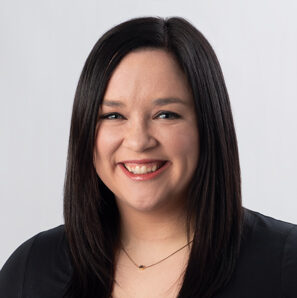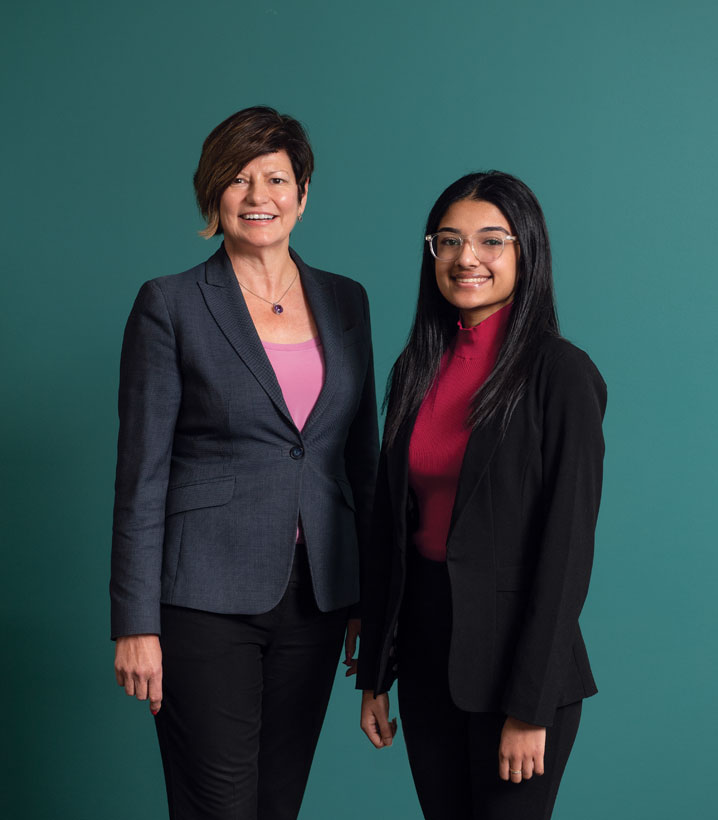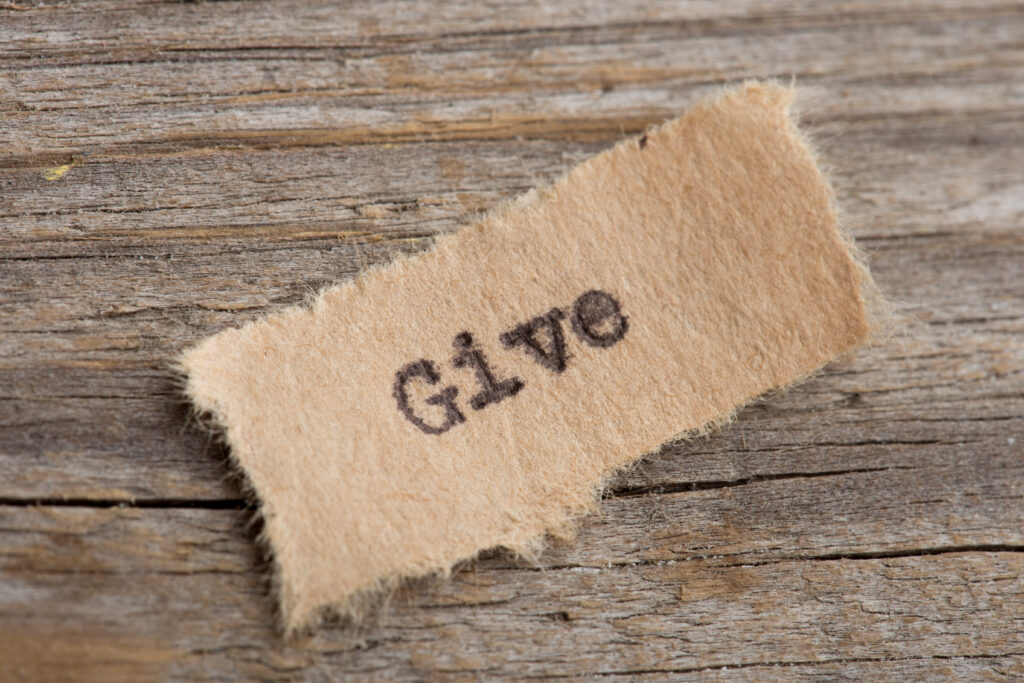Love For Red fights period poverty in Iowa

Maanya Pandey’s life is a balancing act.
The Waukee native is in her junior year at the University of Iowa. She’s majoring in public health on the pre-medicine track, preparing to take entrance exams for medical school. She’s a member of a South Asian fusion dance team.
She’s also the founder and president of Love For Red, a nonprofit she began when she was 15 to help address period poverty in Iowa. Her organization has provided over 150,000 menstrual products across the state of Iowa since 2020. Powerful local women like Rekha Basu, Roxanne Conlin and Rowena Crosbie offer their support on Love For Red’s advisory board.
“It’s slightly incomprehensible,” Pandey said. “I go from studying for the MCAT to having a board of advisers meeting where I’m interacting with such amazing, successful women in Iowa. Then I go home and I’m just like, ‘Did that happen?’”
That balancing act is worth it for her if she can help alleviate the burden of stigma and inaccessibility that comes with menstruating for many women and girls.
Founding Love For Red has taught her to dream big and be a change-maker, she said. She hopes her organization can make that opportunity more accessible for other girls and women, too.
“One in five students struggle to afford period products, and that causes over 80% to miss school. It’s not like you stop menstruating when you go to work, so it affects your work too,” Pandey said. “Menstruating is nothing new. It clearly has consequential effects on people’s livelihood and their ability to live, work and succeed.”
A problem at home
In 2020, Pandey was 15 years old and adjusting to online schooling during the pandemic when she came across an Instagram video detailing how incarcerated women managed their periods.
She learned many of these women had little access to female hygiene products, unable to purchase more due to low wages and often resorting to unsanitary measures. She soon discovered the issue of period poverty was prevalent everywhere, even in Iowa.
When she couldn’t find other organizations dedicated to solving the problem, she created her own.
“I went to my parents and told them, ‘I want to do something about this.’ And my mom was like, ‘Is that really an issue here in the U.S.?’” Pandey said.
Research shows it is. According to the National Institutes of Health, nearly 16.9 million menstruating women are living in poverty in the U.S., and two-thirds of those women are unable to afford basic menstrual products. The inability to afford these products is linked to higher rates of depression and puts women more at risk for health issues such as urinary tract infections.
“Students risk missing up to nine weeks of the school year due to their period. The chronic absenteeism is connected to higher dropout rates, lower rates of graduation, failing, suspensions, all of those things. It has a direct correlation to your success,” Pandey said.
Crosbie, president of Tero International and a member of Love For Red’s advisory board, had been a part of a committee in her rotary club addressing the need for menstrual products and education in Uganda. Like Pandey’s mother, she was also surprised to learn the issue existed much closer to home.
“I heard the need we have in Central Iowa and I thought, ‘Seriously, Waukee?’” Crosbie said. “So many of us enjoy privilege. We know what’s going on with our bodies and we’ve got access to products and to hygiene. But there’s so many girls and women here in Iowa, around the United States and around the globe that don’t have that.”
Service, advocacy and awareness
Pandey said Love For Red has donated to 55 schools across Iowa since its founding, plus community organizations such as the Des Moines Y Camp and Des Moines Refugee Support. There are over 90 schools on its waiting list, and over 30 schools requested products on a single day last October.
“It’s just because of capacity right now that we can’t donate to all of them at the same time. We’ve been focusing especially on the schools where staff are spending their own money on period products,” Pandey said.
Crosbie added that they haven’t found a way to purchase hygiene products at wholesale prices, so each product has been purchased at full retail.
“It could really accelerate the difference you can make if you could cut your costs in half,” she said.
The need continues to surprise them. Pandey has built a team of volunteers around her. She runs the Iowa City operations while her mom helms efforts in Des Moines. Schools and organizations reach out with requests for products, and the Love For Red team provides “period packs,” often assembled by groups of volunteers, that include a variety of different types and sizes of products.
The organization also has a student ambassador program, where student leaders manage the product needs in their own school. The idea is to involve more people in talking about and addressing the issue of period poverty in hopes of combating the stigma around talking about periods.
Love For Red does this through a three-pronged approach: service, advocacy and awareness. The service element lies in the donation of products. Advocacy and awareness take the form of educating people about period poverty and the female body and attempting to change the conversation around the topics.
Breaking the stigma
Crosbie recounted the story of when she was first taught to feel shame around the topic of menstruation.
“My mom sent me over to the grocery store to get [menstruation products], which I didn’t even really know that much about. As I was walking home, it was in a paper bag. A bunch of friends were playing on the street, and for whatever reason, they needed a bag, so gave them [my bag]. My mom was horrified. I didn’t understand what was so top secret about it,” Crosbie said..
Pandey has seen this type of shame often in her work. Love For Red provides education about period poverty and stigma with after-school groups and at festivals and events. She explained she often sees people get visibly uncomfortable or immediately turn around when they see the topic they’re discussing. She’s heard from girls who received no support from their parents and had to figure out how to deal with their cycles themselves.
She and Crosbie believe that if more people talk about the subject, the more these young women won’t have to navigate this experience in silence.
Love For Red’s advocacy has also taken them up to the Capitol for a Day on the Hill each year. They’ve met with legislators to demonstrate the needs in Iowa schools and convince them that this is an issue they should care about. This year, they campaigned for grant funding for schools to purchase menstrual products. One of the volunteers even spoke with Gov. Kim Reynolds.
Even at the Capitol, the group has run into folks’ discomfort talking about the menstruating experience.
“Finding areas of support has definitely been a challenge because our topic is very taboo. I think the world has made it a scary thing to talk about,” Pandey said.
While the work is aimed at helping women and girls across the state, it’s also built Pandey’s confidence and understanding of what she wants to accomplish. As a young woman of color, she’s grown used to people not taking her seriously.
The more she uses her voice, the louder it gets. Her future goals include studying and caring for women’s health as a health care provider.
By then, she hopes Love For Red is no longer needed.
“I’d like to be able to get the problem of period poverty in schools solved in Iowa, and then be able to go to something else. We started with prisons — it’d be really cool to be able to go into that arena, and then continue on with community organizations,” Pandey said. “We had an adviser member mention domestic violence shelters, and I think that would be really cool to get into, too. The ultimate goal is to not exist and not have a need for us to be there.”

Macey Shofroth
Macey Shofroth is the Fearless editor at Business Record. She covers gender, nonprofits and philanthropy, HR and leadership, diversity, equity and inclusion.









